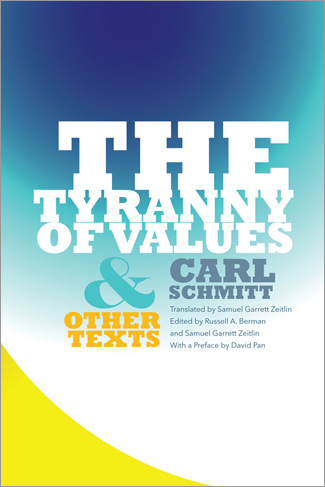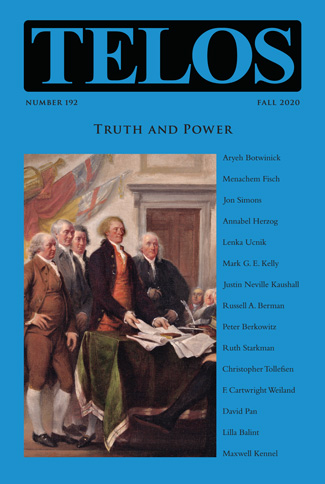In today’s episode of the Telos Press Podcast, Camelia Raghinaru talks with Marcin Skladanowski about his article “Criticism of Western Liberal Democracy by Patriarch Kirill of Moscow and All Rus’,” from Telos 193 (Winter 2020). An excerpt of the article appears here. To learn how your university can subscribe to Telos, visit our library recommendation page. Print copies of Telos 193 are available for purchase in our store.
|
In the Spring issue of American Affairs, Blake Smith writes at length about Carl Schmitt’s “The Tyranny of Values,” the title essay of the collection The Tyranny of Values and Other Texts, published by Telos Press. Edited by Russell A. Berman and Samuel Garrett Zeitlin, translated by Samuel Garrett Zeitlin, and with a preface by David Pan, Schmitt’s The Tyranny of Values and Other Texts is now available for purchase in our online store. Save 20% off the list price by using the coupon code BOOKS20 during the checkout process. An excerpt from the review:
Telos 192 (Fall 2020): Truth and Power is now available for purchase in our store. Individual subscriptions to Telos are also available in both print and online formats.
First, there are natural scientific truths that even autocrats and totalitarians do not seek to deny, as they are the source of the technological tools that can support any attempt to maintain power. Here, there is certainly no conflict between truth and power. Not only does political power depend on technological achievement, but natural scientific facts cannot be covered up by lies and ideology for long. Consequently, political actors must pay attention to natural scientific and technical knowledge, even if they then instrumentalize it in different ways. The following essay comments on the interview with Hans-Georg Maaßen conducted by Moritz Schwarz and published in Junge Freiheit on August 14, 2020. An English translation of the interview appears here. In the wake of the opening of the Berlin Wall and the collapse of the Soviet Union, it appeared that liberal democracy was on an inexorable victory march around the world. The Soviet satellite states threw off their Communist shackles, and the occupied Baltics regained their independence. Even Russia seemed briefly to be lurching toward modern governance structures, and the Central Asian states, the “stans,” claimed their own sovereignty (if only, often as not, to revert to indigenous forms of authoritarianism). The age of Latin American dictatorships belonged to the past, certainly in the southern cone and in Brazil, although not in Venezuela and Cuba. The last aftershocks of that democratic optimism informed the hope that toppling Saddam Hussein in Iraq would set off a similar democracy wave in the Middle East; no doubt the demonstration of the vulnerability of the dictator in Baghdad set the stage for the Arab Spring of 2011, another burst of hope. That Arab Spring of hope gave way to a new winter in the Middle East and not only there. The wave of democracy has been followed by a wave of repression. Perhaps one should have paid more attention in 1989, which not only witnessed the November celebration in Berlin but also the bloody June in Beijing, where the democracy movement at Tiananmen was murdered by the Communist Party and its tanks. It was wrong to assume that the formal end of the Soviet Union meant the end of Communism altogether or that Communist agitation would cease to undermine free societies. That old mole continues to burrow. New from Telos Press: The Tyranny of Values and Other Texts, by Carl Schmitt. Translated by Samuel Garrett Zeitlin, edited by Russell A. Berman and Samuel Garrett Zeitlin, and with a preface by David Pan. Order your copy in our online store, and save 20% on the list price by using the coupon code BOOKS20 during the checkout process.
In “Values or Virtues, Nietzsche or Aristotle?” Jay Gupta outlines the way that value discourse stifles normative intention and the ethical imagination. The aim of the paper is to “suggest that the language of values disguises a deeper, normatively richer language of virtue, and . . . point[s] to the importance of recovering that language in the modern age, as well as the difficulties that must attend such a recovery.” Before exploring the merits of the article, I wish to offer a few clarificatory notes. Recently, there has been a conspicuous number of thinkers that have advocated a return to virtue ethics. Perhaps the most notable among these is Elizabeth Anscombe, who, with the paper “Modern Moral Philosophy,” uncovers the supposed banality of modern moral philosophy and points to the ways in which moral discourse has retained elements of the Christian ethical tradition. |
||||
|
Telos Press Publishing · PO Box 811 · Candor, NY 13743 · Phone: 212-228-6479 Privacy Policy · Data Protection Copyright © 2024 Telos Press Publishing · All Rights Reserved |
||||









